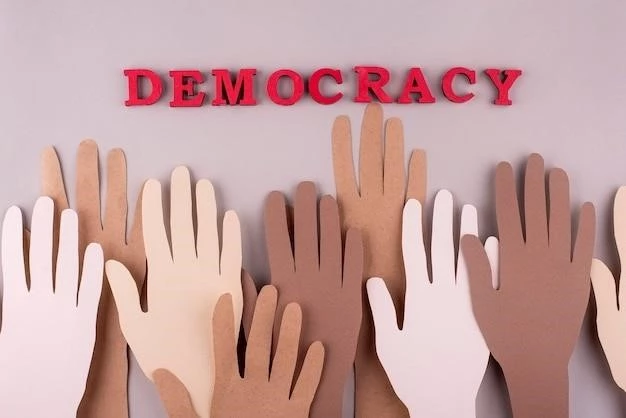Key Principles of Democracy: Liberty‚ Equality‚ and Citizen Participation
Democracy‚ a system of government where supreme power is vested in the people and exercised by them directly or indirectly through a system of representation‚ rests upon a foundation of fundamental principles. These principles‚ often referred to as the cornerstones of democracy‚ ensure that the system functions effectively and upholds the values of fairness‚ justice‚ and individual rights. Three key principles stand out as the pillars of democracy: liberty‚ equality‚ and citizen participation.

Liberty: The Foundation of Individual Freedom
Liberty‚ the freedom to think‚ speak‚ and act without undue interference from the state or other individuals‚ is the bedrock of democracy. It encompasses a broad range of rights‚ including:
- Freedom of Speech and Expression: The ability to express oneself without fear of censorship or reprisal‚ a cornerstone of a vibrant and informed public sphere.
- Freedom of Religion: The right to practice one’s faith without fear of persecution or discrimination‚ ensuring individual autonomy in matters of belief.
- Freedom of Assembly: The right to gather peacefully and express collective views‚ allowing for the articulation of diverse opinions and the mobilization of social action.
- Freedom of Association: The right to join and participate in groups and organizations‚ fostering civil society and promoting collective action.
- Freedom of Movement: The right to travel and reside within and outside the country‚ ensuring individual mobility and autonomy.
These freedoms are not absolute‚ and limitations may be imposed to protect the rights of others or ensure public safety. However‚ such limitations must be narrowly tailored and subject to judicial review‚ ensuring that they do not infringe upon the core essence of liberty.
Equality: Ensuring Fairness and Justice
Equality‚ the principle that all individuals are created equal and entitled to equal treatment under the law‚ is another essential pillar of democracy. This principle emphasizes:
- Equal Protection under the Law: All individuals are subject to the same laws and judicial processes‚ regardless of their background‚ beliefs‚ or status.
- Equal Access to Opportunities: All individuals have the same chances to succeed in life‚ irrespective of their social or economic circumstances. This includes access to education‚ healthcare‚ and employment opportunities.
- Equal Representation: All groups in society have a fair and proportionate voice in the political process‚ ensuring that diverse perspectives are considered and reflected in government policies.
Equality‚ however‚ does not mean absolute sameness. Recognizing the diversity of human experiences‚ democracy acknowledges the need for affirmative action and other measures to address historical and ongoing inequalities that hinder full participation in society.

Citizen Participation: The Lifeblood of Democracy
Citizen participation‚ the active engagement of citizens in the political process‚ is the lifeblood of democracy. It encompasses various forms of involvement‚ including:
- Voting: The fundamental right and responsibility of citizens to choose their representatives and influence government policy through the ballot box.
- Political Activism: Engaging in political discourse‚ advocating for specific issues‚ and organizing campaigns to bring about change.
- Civil Society Engagement: Participating in community organizations‚ non-governmental organizations‚ and other groups working to address social issues and promote the common good.
- Public Discourse: Engaging in open and respectful dialogue with others on matters of public concern‚ fostering informed decision-making and collective action.
Citizen participation is not merely a right but also a responsibility. An informed and active citizenry is crucial for ensuring that democratic processes are responsive to the needs and aspirations of the people they are designed to serve.
Conclusion: Upholding the Principles of Democracy
Liberty‚ equality‚ and citizen participation are the cornerstones of a thriving democracy. By upholding these principles‚ we create a society where individuals are free to live their lives with dignity‚ where everyone has an equal chance to succeed‚ and where citizens have a meaningful voice in shaping their collective future. These principles are not static but rather dynamic‚ constantly evolving in response to changing social realities and challenges. The continued commitment to these principles is essential for ensuring that democracy remains a vibrant and responsive system of government‚ capable of meeting the needs of all its citizens.










